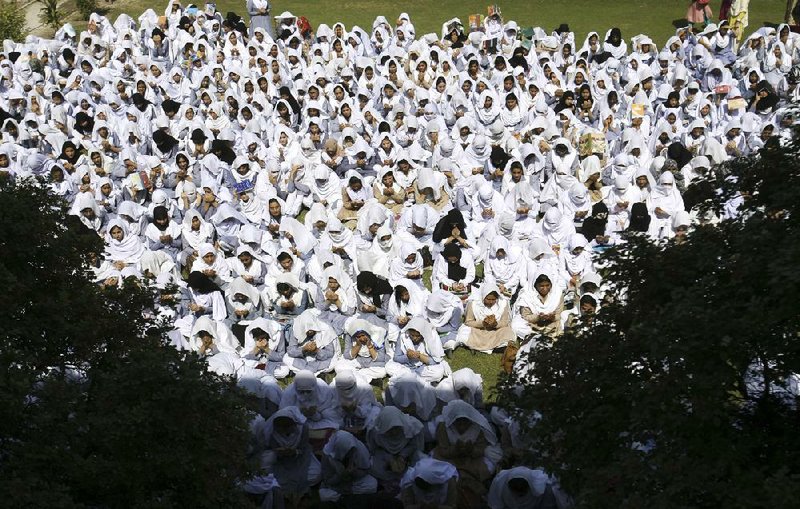MINGORA, Pakistan — Pakistani police have arrested a number of suspects in the case of a 14-year-old girl shot and wounded by the Taliban for promoting education for girls and criticizing the fundamentalist Islamic movement, officials said Friday.
The shooting of Malala Yousufzai along with two classmates while they were on their way home from school Tuesday horrified people in Pakistan and internationally. It has been followed by an outpouring of support for a girl who earned the enmity of the Taliban for publicizing their acts and speaking about the importance of education for girls.
The Taliban have claimed responsibility for the shooting, saying that the girl was promoting “Western thinking.”
Police have been questioning people in the town of Mingora, in the Swat Valley, where the shooting took place.
Mingora Police Chief Afzal Khan Afridi said arrests had been made, but he declined to give any details about the number of people detained or what role they’re suspected of having in the shooting. He said he did not want to endanger the ongoing investigation.
Interior Minister Rehman Malik told reporters Friday that the two gunmen who staged the attack were not among those arrested, but he said investigators had identified the masterminds of the shooting and efforts were under way to capture all those involved.
The Taliban spokesman, Sirajuddin Ahmad, said Malala’s family had been warned three times - the most recent warning coming last week - before the decision was made to kill her.
Ahmad said local Taliban leader Maulana Fazlullah and his deputies selected three attackers, including two trained sharpshooters, who carefully studied the girl’s route home from school.
Even before the Taliban took over the Swat Valley, Fazlullah’s radio broadcasts spread fear among residents in the area. The group first started to exert its influence in 2007 and quickly extended its reach to much of the valley by the next year. They set about imposing their will on residents by forcing men to grow beards, preventing women from going to the market and blowing up many schools - most for girls.
Malala wrote about these practices in a journal for the BBC under a pseudonym when she was just 11. After the Taliban were pushed out of the valley in 2009 by the Pakistani military, she became even more outspoken in advocating for girls’ education. She appeared frequently in the media and was given one of the country’s highest honors for civilians for her bravery.
Fazlullah, along with much of the Swat Taliban’s top leadership, escaped the offensive and is believed to be operating from a base in eastern Afghanistan and sending fighters back across the border to attack northwest Pakistan.
But there are indications that he was trying once again to make inroads into the area.
Between April and June, Pakistani authorities arrested nearly 100 militants in the Swat Valley, said two security officials and a senior government official.
One of those arrested was a woman identified as Naheed Bibi, who was married to Fazlullah and had been sent by him to the valley to help reactivate militant cells there, the officials added.
Her interrogation led security officials to more than 60 telephone numbers of SIM cards she and her aides had bought in various northwestern cities. By monitoring all the numbers, authorities rounded up the militants - including several would-be suicide bombers - and a large number of weapons and explosives were also seized, the officials said.
The officials did not want to be identified because they were not authorized to speak to the media.
Pakistanis across the country held services to pray for Malala’s recovery Friday. Prime Minister Raja Pervaiz Ashraf visited the hospital in Rawalpindi where she’s being treated to pay his respects and check on her condition.
As the school Malala attended reopened, children and teachers tried to come to terms with what happened to their star pupil, shot in a bus roughly 300 yards from her classrooms. Police were deployed around the school, but many students still stayed away.
The girl was initially airlifted from Mingora to a military hospital in the frontier city of Peshawar, where doctors removed a bullet from her neck. On Thursday, she was transferred to a hospital in Rawalpindi, where the Pakistani army is headquartered near the capital, Islamabad.
Maj. Gen. Asim Saleem Bajwa said she is being kept on a ventilator and is in stable condition. Bajwa said the bullet entered her head and went into her neck toward her spine, but it was too soon to say whether she had any significant head injury.
Meanwhile, Pakistani police have opened a blasphemy case against a teenage Christian boy accused of sending derogatory text messages about Islam’s prophet to neighbors in the southern city of Karachi, an official said Friday.
The 17-year-old is in hiding along with family members after neighbors angrily came to his house Wednesday to inquire about the text messages, said senior police officer Shahid Hayat.
The mob ransacked the family’s home and then lodged a formal complaint against the boy with police, Hayat said.
Information for this article was contributed by Munir Ahmed, Zarar Khan, Adil Jawad, Rebecca Santana, Asif Shahzad and Anwarullah Khan of The Associated Press.
Front Section, Pages 6 on 10/13/2012

